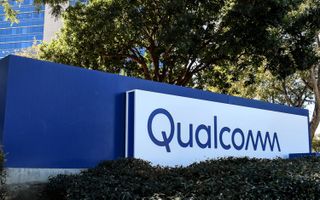Good Apple: Qualcomm's Market Value Rises by More Than $30 Billion

It's safe to say that Qualcomm's shareholders like this Apple: the chip maker's market value has jumped more than $30 billion since the two companies announced their ceasefire on April 16. Qualcomm's share price closed with a 23 percent increase that day, according to Reuters, and it's risen another 17 percent at the time of writing. (Apple's stock also rose after the announcement, but it's only seen a marginal increase compared to Qualcomm.)
The ceasefire in question involves Qualcomm and Apple's decision to dismiss all litigation against each other. Apple said it would pay Qualcomm as part of a settlement, but it didn't say how large that payment would be. More important was the news that the companies entered a six-year patent license agreement as well as a "multiyear chipset supply agreement" that's expected to see Qualcomm supply the 5G modems for upcoming iPhone models.
Saying this is a dramatic reversal would be an understatement. The fight between Qualcomm and Apple seemed poised to go on for some time as the companies duked it out in courtrooms around the world. Apple had also tapped Intel to supply the modems in the first 5G-compatible iPhone model, and despite reports of friction between the companies, Intel said earlier this month that it was on track to meet Apple's supply demands.
That changed after Qualcomm and Apple revealed their ceasefire. Not long after, Intel announced that it would exit the 5G smartphone market to focus on Internet of Things products, PCs, and other devices going forward. Intel's share price also saw a modest bump after its announcement; whether that's because of broader gains in the semiconductor market or because shareholders are happy the company's leaving a low-margin business is unclear.
This turn of events highlights just how much Qualcomm and Apple rely on each other. Qualcomm needs to sell its modems to as many smartphone makers as possible to maintain its hold--which various regulators have called anticompetitive--on the market. Apple needs enough modems to meet demand for the next iPhone, and even though iPhone sales dropped at the end of 2018, that's still a lot of devices for one company to help make.
Apple could be trying to reduce its dependence on Qualcomm, with reports indicating that it's planning to make its own wireless modem. But for now, the companies depend on each other. That could be why they decided to put an end to their legal battles, why they entered years-long agreements despite their contentious relationship, and why Qualcomm shareholders have reacted so favorably to the news. What are a few billion-dollar lawsuits between friends?
Stay On the Cutting Edge: Get the Tom's Hardware Newsletter
Get Tom's Hardware's best news and in-depth reviews, straight to your inbox.

Nathaniel Mott is a freelance news and features writer for Tom's Hardware US, covering breaking news, security, and the silliest aspects of the tech industry.
Most Popular


